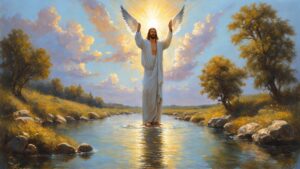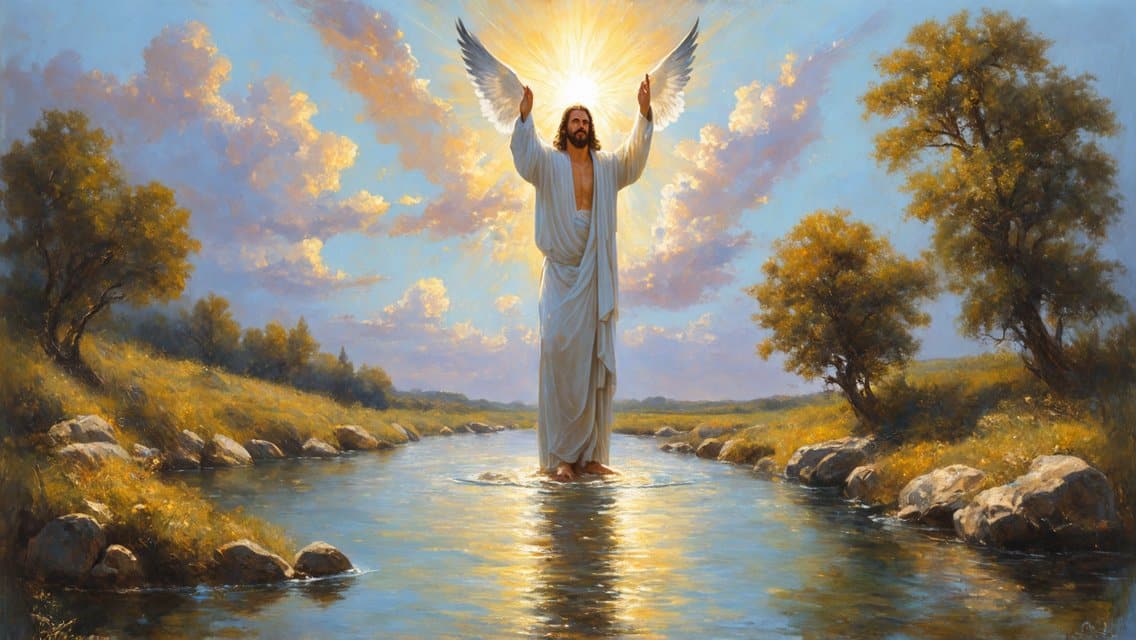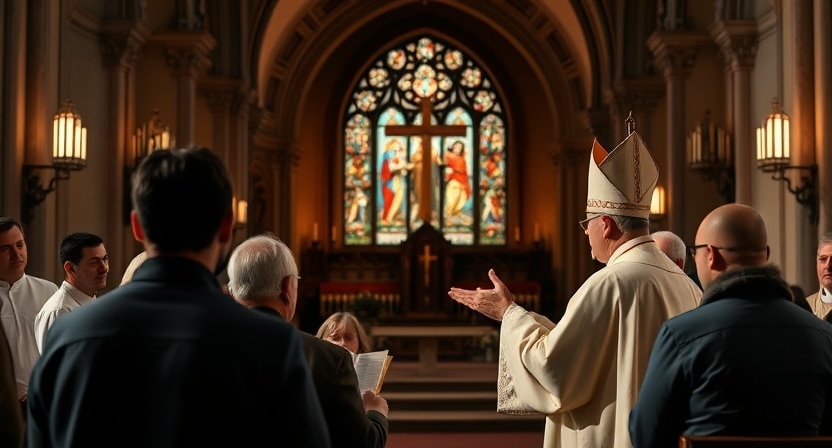BAPTISM OF THE LORD YEAR A
INTRODUCTION AND CONFITEOR
Today we celebrate the Baptism of Christ. Christ, the sinless one, joined the queue of sinners, and was baptised by his cousin John in the waters of the Jordan. He did this so as to free us from the power of sin. Let us pause to call to mind our sins. [Pause]
Let us not be afraid to confess our sins, since Christ came to take them away. You were sent to heal the contrite of heart. Lord, have mercy.
You came to call sinners to repentance. Christ, have mercy.
You plead for us now at the right hand of the Father. Lord, have mercy.
HEADINGS FOR READINGS
First Reading (Isaiah 42: 1-4.6-7). Here we are given a portrait of a true servant of God. He is gentle and humble of heart, and totally dedicated to his mission, which is to bring about true justice.
Second Reading(Acts 10:34-38). Here we have a description of how the early Christians saw Baptism. The baptised person was said to have been ‘anointed with the Holy Spirit and with power.
Gospel (Matthew 3:13-17). This tells of the Baptism of Jesus in the river Jordan by his cousin John, how his true identity was revealed, and how he was given power for the mission he was about to begin.
1st Reading – Isaiah 42:1-4, 6-7
1 Thus says the LORD: Here is my servant whom I uphold, my chosen one with whom I am pleased, upon whom I have put my spirit; he shall bring forth justice to the nations,
2 not crying out, not shouting, not making his voice heard in the street.
3 a bruised reed he shall not break, and a smoldering wick he shall not quench,
4 until he establishes justice on the earth; the coastlands will wait for his teaching.

6 I, the LORD, have called you for the victory of justice, I have grasped you by the hand; I formed you, and set you as a covenant of the people, a light for the nations,
7 to open the eyes of the blind, to bring out prisoners from confinement, and from the dungeon, those who live in darkness.
Or Acts 10:34-38
34 Peter proceeded to speak to those gathered in the house of Cornelius, saying: “In truth, I see that God shows no partiality.
35 Rather, in every nation whoever fears him and acts uprightly is acceptable to him.
36 You know the word that he sent to the Israelites as he proclaimed peace through Jesus Christ, who is Lord of all,
37 what has happened all over Judea, beginning in Galilee after the baptism
that John preached,
38 how God anointed Jesus of Nazareth with the Holy Spirit and power. He went about doing good and healing all those oppressed by the devil, for God was with him.”
Responsorial Psalm – Psalms 29:1-2, 3-4, 3, 9-10
R. (11b) The Lord will bless his people with peace.
1 Give to the LORD, you sons of God,
give to the LORD glory and praise,
2 Give to the LORD the glory due his name;
adore the LORD in holy attire.
R. The Lord will bless his people with peace.
3 The voice of the LORD is over the waters,
the LORD, over vast waters.
4 The voice of the LORD is mighty;
the voice of the LORD is majestic.
R. The Lord will bless his people with peace.
3B The God of glory thunders,
9 and in his temple all say, “Glory!”
10 The LORD is enthroned above the flood;
the LORD is enthroned as king forever.
R. The Lord will bless his people with peace.
Alleluia – Mark 9:7
R. Alleluia, alleluia.
7 The heavens were opened and the voice of the Father thundered:
This is my beloved Son, listen to him.
R. Alleluia, alleluia.
Gospel – Matthew 3:13-17
13 Jesus came from Galilee to John at the Jordan to be baptized by him.
14 John tried to prevent him, saying, “I need to be baptized by you, and yet you are coming to me?”
15 Jesus said to him in reply, “Allow it now, for thus it is fitting for us to fulfill all righteousness.” Then he allowed him.
16 After Jesus was baptized, he came up from the water and behold, the heavens were opened for him, and he saw the Spirit of God descending like a dove and coming upon him.
17 And a voice came from the heavens, saying, “This is my beloved Son, with whom I am well pleased.”
HOMILY
Christ was thirty years of age when he began his public ministry. Why did he wait so long? After all, he had only three years left, so why did he leave it so late to begin the real work of his life? Why did he waste his time making handles for spades, or repairing cart wheels, or doing whatever village carpenters of that time did? These would seem to be reasonable questions. But a little thought will show that this is not so.
The first thing we must do is take the incarnation seriously. This means that Christ had to grow up like everyone else. Before the age of about thirty, what experience has a person to draw on? You hear of child prodigies. For instance, Mozart was playing minuets at the age of four. But in the case in hand, we are dealing with something very different.
Christ was a teacher, not, however, of some subject such as history which can be learnt out of books. He was a teacher of religion, or better, of spirituality. Now spirituality is not like learning to play the violin. It is like a seed that is planted in the soul, a seed which needs long and careful nurturing in order to grow and ripen. It has to be experienced and lived before it can be taught effectively. This is why time is important. To take time is to wait. Waiting, however, is one of the hardest occupations of all. So many lovely things are ruined or lost because people can’t wait.
A man planted two dozen apple trees in his garden. He was delighted when they took root. However. he soon discovered that they grew very slowly, and demanded constant care and attention. When several years went by, and no apples appeared on the trees, his patience began to run out. But then a friend urged him to wait just one more year.
But the winter that followed was a very severe one. To compound matters, there was an acute shortage of fuel. By the end of February our friend had used up the last of his supply. One day he was standing in the kitchen looking out at a snow-covered garden. The cold was biting into him. He walked around the room in an effort to warm himself. He paused in front of the empty fireplace. Then he looked out the window again. There they were – the apple trees – their dark branches standing out against the surrounding whiteness. The last thing he desired at that moment was an apple. The only thing that mattered was to keep himself warm. Then his eye fell on an axe. In a flash the decision was made. He took the axe, went out into the garden, and cut down the smallest of the trees.
Later, as he sat warming himself in front of the fire, he said to himself: ‘I won’t miss one, and the cold will surely be gone by tomorrow.’ But next day dawned as cold as ever. Forgetting his resolution, he went out again, laid siege to another tree, which duly ascended to heaven in the form of smoke. Do you know what happened? The cold refused to relent, and day after day he felled a tree. Long before the cold ended, he had cut down the last of the apple trees. He couldn’t wait. Waiting requires not only patience but discipline as well. We have to sacrifice the immediate and the immature, for the long-term and the mature.
It is very wrong to write off the first thirty years of Christ’s life as of little account, or even a waste. Nothing could be further from the truth. During those years he was waiting. But what was he doing? What is the seed doing between spring and autumn? It is growing, maturing, and ripening. So it was with Christ. St Luke says: ‘He grew in wisdom, in stature, and in favour with God and men.’ (Lk 2:52). During those years he knew special moments. One such moment occurred when he was twelve. He did not so much lose himself in the temple; he began to find himself. But the day on which he was baptised by John was, in a sense, the most important day in his life. It was a day of awakening. It was a day of decision-making. It was a day in which he answered another call, a call that had been getting louder and louder inside him. It wasn‘t that he suddenly became a different person when the spirit descended on him. It was just that he took up a new work. It was time to begin to reap the harvest. What was for him a time of reaping, was for us a time of sowing. Though this sowing lasted only three years, the world is still reaping the harvest.
Life calls for a lot of waiting. But we must not wait for something great to happen. We must live the present moment to the full. The future is in God’s hand. What if we are only involved in a menial or obscure job? It makes no difference. It will give us an opportunity to grow. The most important thing in life is not the work we do, but what we make of ourselves. No doubt we are all given special moments of enlightenment and awakening. We should recognise these and treasure them. However, we must not write off any part of our lives as useless, or any experience as wasted, no matter how bitter.
As Christians the main aim of our lives must be to become like Christ. We too must ‘grow in wisdom and grace’. Baptism planted the seed of Christ like living in our souls. It took Christ thirty years to reach maturity and to acquire wisdom. It will take us, not just thirty years, but a lifetime to grow, to mature, and to ripen as human beings and children of God.
Therefore we must be patient with ourselves and with others. People develop at different speeds. Each must be given as much time as is necessary. We have been given the same Spirit that Jesus was given. This Spirit will guide and strengthen us. Besides this, we have the support and encouragement of our brothers and sisters in the Christian community into which we were inserted at Baptism.
‘We must bear hardship in order to ripen.’ (Van Gogh)
‘Haste ruins saints as well as artists.’ (Thomas Merton)
’No single event can awaken in us a stranger that is completely unknown to us.’ (Antoine de Saint Exupéry)
PRAYER OF THE FAITHFUL
Let us pray through Christ our Brother that with the Holy Spirit to inspire and strengthen us, we may be able to model our lives on his. R. Lord, graciously hear us.
For the Church: that it may carry on Christ’s work of love and service to others. [Pause] Lord, hear us.
For all political leaders: that they may work to build a world free of poverty and oppression, so that all of God’s children can live in freedom and dignity. [Pause] Lord, hear us.
For all those who are in the doldrums, especially for those who are out of work. [Pause] Lord, hear us.
That we may be patient with ourselves and with others, and that we may not judge the success of our lives by worldly standards. [Pause] Lord, hear us.
For local needs.
Let us pray:
Father, we thank you for the grace of Baptism which makes us your children. Help us to live it out in our daily lives by showing you the trust of a child, and by becoming envoys of your love and peace to others. We ask this through Christ our Lord.
COMMUNION REFLECTION
Baptism was not over and done with
when the priest poured water over our infant foreheads.
The truth is we are being baptised
by everything that happens to us in life.
We are baptised by trials and difficulties:
in their turbulent waters
we are purified of all that is false and useless.
We are baptised by suffering:
in its murky waters
we grow in humility and compassion.
We are baptised by joy:
in its gurgling waters
we experience the goodness of life.
We are baptised by love:
in its singing waters
we blossom like flowers in the sun.
To be baptised is to be christened,
which means to be made like Christ.
The sacrament, however, only begins this.
It is like the planting of a seed.
It will take a lifetime for this seed to grow and ripen,
for the image of Christ to be formed in us.


